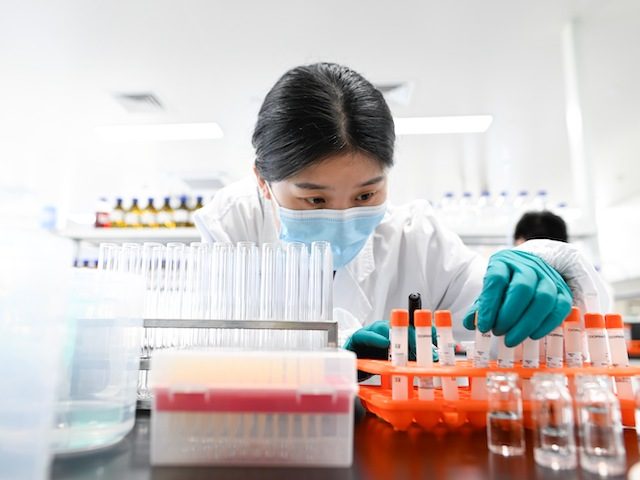Chinese health regulators approved a new coronavirus vaccine candidate for emergency use in China on Monday without releasing clinical trial data on its efficacy rate or safety.
The head of the Chinese Center for Disease Control, Gao Fu, “led the development of a protein subunit vaccine that was approved by regulators last week for emergency use,” the Chinese Academy of Sciences’ Institute of Microbiology said in a statement” on March 15, according to the Associated Press (AP).
China’s Anhui Zhifei Longcom Biopharmaceutical company worked with the Chinese Academy of Sciences to develop the new Chinese coronavirus vaccine candidate.
“The team finished phase 1 and phase 2 clinical trials in October and is currently conducting the last phase of trials in Uzbekistan, Pakistan, and Indonesia,” according to Monday’s press release. Uzbekistan launched Phase III clinical trials of the vaccine candidate in December and approved it for emergency use in the country on March 1.
Despite two countries approving the vaccine candidate for emergency use this month, “[t]here is no publicly available information in peer-reviewed scientific journals about the clinical trial data showing efficacy or safety” for the shot, the AP noted on March 15. A spokesperson for Anhui Zhifei Longcom said on Monday that the vaccine candidate’s efficacy data cannot be shared publicly at this time, adding that the company was providing available information to relevant health authorities.
The vaccine candidate requires three separate doses spaced one month apart, according to a company spokesperson for Anhui Zhifei Longcom. Like CoronaVac, another Chinese-made coronavirus vaccine candidate approved for emergency use in China, the new shot may be stored at normal refrigeration temperatures, typically at or below 40 degrees Fahrenheit. CoronaVac has an efficacy rate of 50.38 percent against the Chinese coronavirus and is currently not approved for use in people 60 and over in China over safety concerns. Three people died and at least two people were admitted to intensive care units in Hong Kong this month shortly after receiving doses of CoronaVac in Hong Kong, where authorities waived health requirements to approve the shot’s use among senior citizens.
Adults 18-59 years old are the only age group so far allowed to receive a coronavirus vaccine candidate in China. Health officials in the country have cited a lack of clinical trial data for older people as a reason for limiting the shots’ rollout. China’s official press agency, Xinhua, reported over the weekend that some Beijing health clinics have begun offering approved coronavirus vaccine candidates to people ages 60 and older, suggesting that health ministers are now expanding their vaccine distribution to senior citizens.
The Anhui Zhifei Longcom vaccine candidate is a protein subunit vaccine that “trains the body to recognize the spike protein that covers the surface of the [Chinese] coronavirus,” according to the AP. “Scientists grow a harmless version of the protein in cells and then purify it, before it is assembled into a vaccine and injected.”
By comparison, the coronavirus vaccine candidates developed by the U.S. biopharmaceutical companies Pfizer and Moderna are mRNA vaccines.
“This means part of the coronavirus’ genetic code is injected into the body, triggering the body to begin making viral proteins, but not the whole virus, which is enough to train the immune system to attack,” the BBC reported in January.
“CoronaVac is a more traditional method [of vaccine] that is successfully used in many well-known vaccines like rabies,” Luo Dahai, an Associate Professor of Infection and Immunity at Singapore’s Nanyang Technological University told the BBC.
“[The] mRNA vaccines are a new type of vaccine and there is [currently] no successful example [of them] being used in the population,” Luo added.

COMMENTS
Please let us know if you're having issues with commenting.